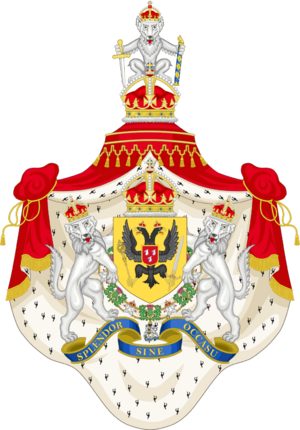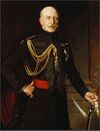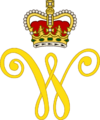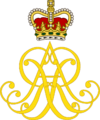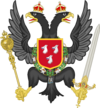Monarchy of Atmora: Difference between revisions
| Line 186: | Line 186: | ||
===Ravenhof Castle=== | ===Ravenhof Castle=== | ||
{{main|Ravenhof Castle}} | {{main|Ravenhof Castle}} | ||
[[File: | [[File:Front_of_Burghley_House_2009.jpg|thumb|right|Ravenhof Castle, Ypenburg.]] | ||
'''Ravenhof Castle''' (''Kasteel van Ravenhof'') | '''Ravenhof Castle''' (''Kasteel van Ravenhof'') | ||
Revision as of 07:05, 1 September 2024
| High Queen of Atmora | |
|---|---|
| Hoge Koningin van Atmora | |
Federal | |
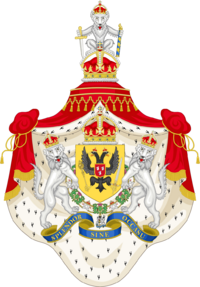 | |
| Incumbent | |
 | |
| Katherine II since 26 May 2012 | |
| Details | |
| Style | Her Majesty |
| Heir apparent | Henrietta, Princess of Wolf |
| First monarch | Alexandra the Great |
| Formation | 15 December 1812 |
| Residence | Royal Palace of Alexandria Ravenhof Castle Coudenberg Palace Wintersholm Palace |
| Website | www |
The Monarchy of Atmora, is the constitutional monarchy and head of state of the Atmoran Confederation whose incumbent is titled as the High King or Queen of Atmora (Dutch: Hoge Koning(in) van Atmora). The current monarch and head of state, High Queen Katherine II, ascended the throne upon the abdication of her father, High King Willem III, on 26 May 2012.
The Constitution of the Atmoran Confederation written in the Anthold Conference of 1813 had given the monarch of Lieseltania the Presidium of the Confederation (Presidium der Statenbond) as a symbol of Atmoran unity and personification of the Atmoran state. As the Atmoran Monarch, Katherine II may at anytime under Section 3 of the Constitution to summon the Federal Princes of Atmora to the Conference of Sovereigns, to address concerns of the Atmoran Confederation. As was done by Katherine I in the Castalien Conference of 1943, to address the fascist AVU Chancellor Louwrens van Geuzendam government, granting Katherine I emergency powers to curtail constitutional limitations.
Origins
Following the defeat of the Kingdom of Asvarre, Kingdom of Gallia, and the Kingdom of Huldenberg during the Atmoran Unification War, in which the Wolfsche League called upon the Princes of Atmora to convene at Pruzhana for the 1812 Conference of Sovereigns for Rijksverkiezing, Chancellor Moltke and Queen Alexandra of Lieseltania with the support of the Wolfsche League and the pro-Lieselania states pushed for Alexandra to be given the title of "High Queen of Atmora" (Hoge Koningin van Atmora). The sovereigns of Alsatia, Gallia, Huldenberg, Lippe, Leuven, and Sayn-Ravenstein were represented by a Rijksstadhouder (Lord Lieutenant of the Realm).
Succession
Accession
End of a reign
Temporary loss of royal authority
Constitutional Role
The High Queen serves as the personification and embodiement of the unification of the Atmoran Confederation, serving as the constitutional monarch along with primus inter parus with the Atmoran Federal Princes. Serving as the living embodiement of the Atmoran state the High Queen serves as the arbitrator and guardian of Atmoran national unity and independence. As such power is not vested by divine right, but through consent of the governed.
Appointment of the Chancellors
Constitutional, political, and historical consequences
Popular support
Arms
Monarchs of Atmora

| Name | Portrait | Birth and death | Reign started | Reign ended | Marriages | Succession right |
|---|---|---|---|---|---|---|
| High Queen Alexandra the Great Hoge Koningin Alexandra de Grote |
5 May 1779 – 25 October 1850 (aged 71) |
15 December 1812 | 25 October 1850 (37 years, 314 days) |
Prince Hendrik of Larsenburg | Elected by the Council of Sovereigns | |
| High Queen Juliet-Alexandra Hoge Koningin Juliette-Alexandra |
30 July 1805 – 3 March 1886 (aged 81) |
25 October 1850 | 3 March 1886 (35 years, 190 days) |
Prince Frederick of Brunswick | Daughter of Alexandra the Great | |
| High King Frederick-Alexander Hoge Koning Frederik-Alexander |
9 November 1828 – 5 August 1904 (aged 76) |
3 March 1886 | 5 August 1904 (18 years, 94 days) |
Eleonora Anne, Jonkvrouwe van Brienen | Son of Juliet-Alexandra | |
| High Queen Elizabeth Hoge Koningin Elisabeth |
17 December 1855 – 11 September 1931 (aged 75) |
5 August 1904 | 11 September 1931 (27 years, 37 days) |
Baron Vincent van Stokvisch | Daughter of Frederick-Alexander | |
| High King Frederick IV Hoge Koning Frederik IV |

|
16 August 1885 – 7 January 1938 (aged 53) |
11 September 1931 | 7 January 1938 (6 years, 118 days) |
Princess Madeleine of Gallia | Nephew of Elizabeth, Grandson of Frederick-Alexander |
| High Queen Katherine I Hoge Koningin Katherina I |
14 December 1917 – 21 May 2013 (aged 96) |
7 January 1938 | 23 May 1980 (42 years, 137 days) |
Count Nikolaas Ulzens van Alsemberg | Daughter of Frederick IV | |
| High King Willem III Hoge Koning Willem III |
8 March 1952 (age 64) |
23 May 1980 | 26 May 2012 (32 years, 3 days) |
Princess Alexandra of Asvarre | Son of Katherine I | |
| High Queen Katherine II Hoge Koningin Katherina II |
23 January 1989 (age 26) |
26 May 2012 | Incumbent | Prince William of Castarcia | Daughter of Willem III |
Royal residences
The royal palaces of the monarch are property of the state
Royal Palace of Alexandria

The Royal Palace of Alexandria (Koninklijke Paleis van Alexandrië) is the official residence of the High Queen. The Royal Palace is located in the Koninginnekwartier in Wolfenhof-Leiderdorp on the banks of the Leidense Meer. Situated centrally in the National Capital District the Royal Palace is surrounded by the Royal Park (Koninklijke Park) with the Queen's Square (Koninginnesplein) situated in front of the Royal Palace.
The offices of the High Queen, and other member of the royal family are in the Royal Palace. While not the primary residence of the High Queen, the Royal Palace is hosts official functions such as banquets, state dinners, diplomatic accreditations, public audiences, receptions, royal christenings, lyings-in-state, receiving and meeting with government officials, along with other official ceremonies. The Royal Palace is guarded by units of the Atmoran Royal Guards regular army and marechaussee units tasked with guarding and escorting the High Queen and her family.
Het Loo Palace

Het Loo Palace (Paleis Het Loo) is the primary residence of the High Queen and the Prince Consort situated in the southeast within the Royal Domain of Het Loo in Altforst, Koningswoude.
Ravenhof Castle
Ravenhof Castle (Kasteel van Ravenhof)
Wintersholm Palace
Monograms
The monograms of the ruling high kings or high queens:
